
The Taiping Rebellion, also known as the Taiping Civil War or the Taiping Revolution, was a civil war in China between the Manchu-led Qing dynasty and the Hakka-led Taiping Heavenly Kingdom. The conflict lasted for 14 years, from its outbreak in 1850 until the fall of Taiping-controlled Nanjing—which they had renamed Tianjing "heavenly capital"—in 1864. However, the last rebel forces were not defeated until August 1871. Estimates of the conflict's death toll range between 20 and 30 million people, representing 5–10% of China's population. While the Qing ultimately defeated the rebellion, the victory came at a great cost to the state's economic and political viability.

The Xianfeng Emperor, also known by his temple name Emperor Wenzong of Qing, personal name Yizhu, was the eighth emperor of the Qing dynasty, and the seventh Qing emperor to rule over China proper. During his reign, the Qing dynasty experienced several wars and rebellions including the Taiping Rebellion, the Nian Rebellion, and the Second Opium War. He was the last Chinese emperor to exercise sole power.

The Nian Rebellion was an insurrection against the Qing dynasty in northern China from 1851 to 1868, contemporaneously with the Taiping Rebellion (1850–1864) in southern China. The rebellion was suppressed, but the population and economic losses contributed to the collapse of the empire in the early 20th century.
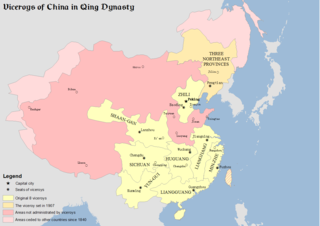
Zongdu were the managers supervising provincial governors in Ming and Qing China. One viceroy usually administered several provinces and was in charge of all affairs of military, food, wages, rivers, and provincial governors within their region of jurisdiction. Viceroys was appointed by and directly reported to the Emperor.

The Jintian Uprising was an armed revolt formally declared by Hong Xiuquan, founder and leader of the Emperor Worshippers, on 11 January 1851 during the late Qing dynasty of China. The uprising was named after the rebel base in Jintian, a town in Guangxi within present-day Guiping. It marked the beginning of the Taiping Rebellion.
Chen Yucheng, born Chen Picheng, was a Chinese general during the Taiping Rebellion and later served as the Heroic (Ying) Prince of the Taiping Heavenly Kingdom in the later stages of the rebellion, nicknamed "Four-eyed Dog" because of two prominent moles below his eyes.
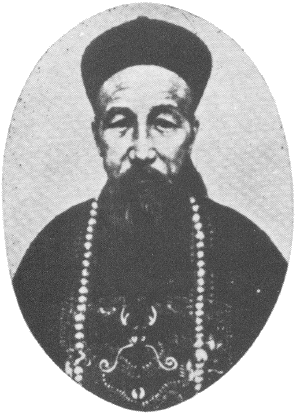
The Xiang Army or Hunan Army was a standing army organized by Zeng Guofan from existing regional and village militia forces called tuanlian to contain the Taiping Rebellion in Qing China. The name is taken from the Hunan region where the Army was raised. The Army was financed through local nobles and gentry, as opposed to through the centralized Manchu-led Qing dynasty. The army was mostly disbanded by Zeng after the re-capture of the Taiping capital at Nanking.
Zhang Guoliang, born in Guangdong, was a Field Marshal for the Qing dynasty. He was born in Gaoyao, Zhaoqing, Guangdong, although Qing stated that he was from Meixian, Guangdong. He was originally a bandit in Guangxi but later joined the Qing Army. He helped to raise the Green Standard Army to 250,000 to fight against the Taiping Rebellion. In the second rout of Army Group Jiangnan in 1860 he was defeated by Li Xiucheng. Zeng Guofan praised Zhang and said he was Jiangnan's "Great Wall of China."
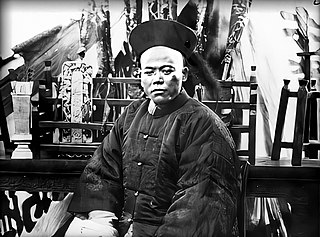
Cheng Xueqi (Chinese: 程學啟; courtesy name Fangzhong 方忠; born in Tongcheng, Anhui, was a general of the Taiping Rebellion who surrendered to the Qing dynasty in 1861 with Ding Ruchang. He was an eminent Han Chinese official and a Captain General in the army of the late Qing dynasty. He led the Huai Army to fight effectively against the Taiping rebels and helped to restore the stability of Qing, along with other prominent figures, including Li Hongzhang and Zeng Guofan, setting the scene for the successful defense of Shanghai and the Suzhou Massacre POW Incident. The Tongzhi Emperor praised Cheng as "intelligent and brave".
Jiangnan Daying or the Jiangnan Battalion; was an army group assembled by the Qing dynasty. The army group consist of mostly Green Standard Army, and their goal was to quell the Taiping Rebellion around the Jiangnan region. The army group twice encircled Nanjing, the capital of the Taiping Heavenly Kingdom, but were defeated by the Taiping forces on both occasions.
The Battle of Nanjing (1853) began after the fall of Wuhan on March 8, 1853, and ended with the fall of the capital city of Nanjing on March 19, 1853, to Taiping troops, a few days after the Qing Government evacuated the city.
The First rout of the Jiangnan Battalion took place between 1853 and 1856 when the Qing government raised the Green Standard Army to fight against the Taiping Heavenly Kingdom. The action involved Qing forces surrounding the city of Nanjing, the capital of the Taiping Heavenly Kingdom.
The Battle of Jiangnan (1860), also known as the Second rout of the Jiangnan Battalion took place between the Qing government's Green Standard Army and the army of the Taiping Heavenly Kingdom during the Taiping Rebellion. The Green Standard Army twice attempted to besiege Nanjing, capital of the Taiping Heavenly Kingdom, but was unable to break through. To break the siege of Nanjing, the Taiping forces maneuvered to divert Qing forces by sacking Hangzhou, before quickly moving back to Nanjing to counter-encircle the Qing siege forces and routing the Green Standard Army garrison completely, breaking the siege of Nanjing.
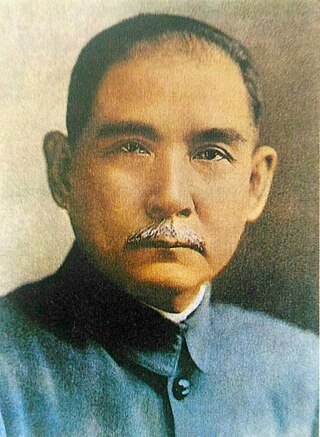
Anti-Qing sentiment refers to a sentiment principally held in China against the rule of the Manchu-led Qing dynasty (1644–1912), which was criticized by opponents as being "barbaric". The Qing was accused of destroying traditional Han culture by enforcing policies such as forcing Han to wear their hair in a queue in the Manchu style. It was blamed for suppressing Chinese science, causing China to be transformed from the world's premiere power to a poor, backwards nation. The people of the Eight Banners lived off government pensions unlike the general Han civilian population.
Xiang Rong was a Chinese military general and politician. He was born in Wuxi County, Chongqing, and was promoted from the rank of a foot soldier during the later years of the Qing dynasty (1644–1912). He was involved in early military operations against the Taiping Rebellion in Henan from 1850 onwards. From then he was a Senior Colonel, after one year the military promoted him be the tidu (提督) of Guangxi, even though he failed, he made the Taiping believers flee Guangxi.

The Taiping Heavenly Kingdom, or the Heavenly Kingdom of Great Peace (1851–1864), was a theocratic absolute monarchy which sought to overthrow the Qing dynasty. The Heavenly Kingdom, or Heavenly Dynasty, was led by Hong Xiuquan. Its capital was at Tianjing, present-day Nanjing. The unsuccessful war it waged against the Qing is known as the Taiping Rebellion.
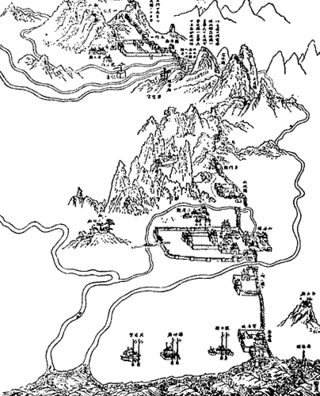
The transition from Ming to Qing or the Manchu conquest of China from 1618 to 1683 saw the transition between two major dynasties in Chinese history. It was a decades-long conflict between the emerging Qing dynasty, the incumbent Ming dynasty, and several smaller factions. It ended with the consolidation of Qing rule, and the fall of the Ming and several other factions.
Events from the year 1860 in China.
Events from the year 1856 in China.
The Battle of Changsha was fought in the early years of the Taiping Rebellion throughout 1852. After defeating Qing forces in Guangxi, the Taipings advanced into neighboring Hunan province. The city was heavily defended and a delay in the Taiping advance allowed Qing forces to reinforce the city. The first attempt to advance north was stopped at an ambush at the Suoyi ford in the Xiang River, where over 10,000 Taiping sailors and soldiers were killed.









